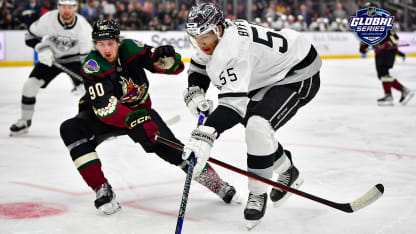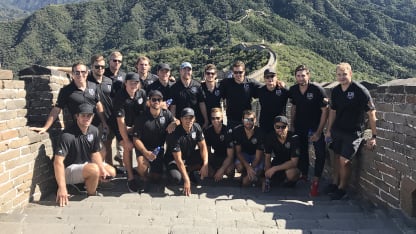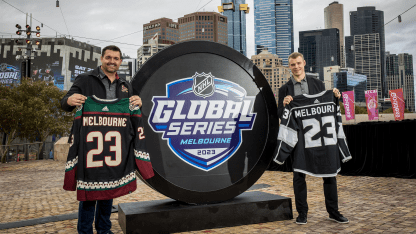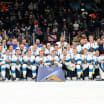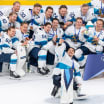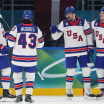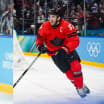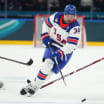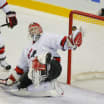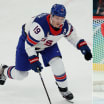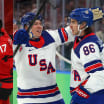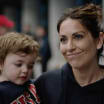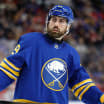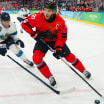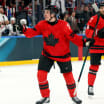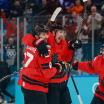"There's a lot of worry just from the studies, not going over there so much but coming back is a little bit," Coyotes general manager Bill Armstrong said. "I've heard it's some of the worst jet lag that can occur. We're very concerned about it, we've had companies in, studying a little bit of the jetlag to make sure we get the minimal effect of it. But we are concerned about it, for sure."
When the Coyotes found out that they'd be heading to Australia, McConnell set out to pick the brains of other sports science directors and performance coaches across the NHL -- and in other sports. He wanted to understand how they had handled long-haul travel and, specifically, travel to Australia.
Even in the NHL, it's not unprecedented, though it is rare. When the Bruins flew to China for the 2018 NHL China Games, they left from Boston, a flight of approximately 16 hours and a time difference of 12 hours.
"Typically, what happens is you have these patterns where you're waking up and you eat, you start to move around a little bit, you're exposed to light, your energy is pretty good," Bruins head performance coach Kevin Neeld said. "As the day goes on, you build up this sleep debt that, as nighttime approaches, you start to become more tired. That is set to a roughly 24-hour cycle.
"So, when you change time zones, your body is still adapted to that cycle that you're coming from. A general rule of thumb is that it takes about a day for your body to reacclimate per hour of time change. … With the longer trips where you're covering more time zones, there's even more of a challenge because your day and night might be completely inverted."
It's like asking someone who works a normal day to suddenly work a night shift -- at peak capacity.
Which is why starting early is key. But not too early.
With most of their players arriving in Phoenix ahead of the official report date, the Coyotes started to adjust the body clocks of their players and staff, including a shift of the voluntary skates from morning to afternoon starting on Thursday. They won't be on Melbourne time -- far from it, with Melbourne 17 hours ahead of both Phoenix and Los Angeles -- but the subtle movements toward it can help.
"All the research, all the literature says to the extent that you can modify your body clock and circadian rhythm, it's really two to three days is the ideal window," McConnell said. "Anything further out than that isn't necessary and anything less than that might not be helpful."
And then that's when their AI-supported app kicks in. Starting on Saturday morning, the Coyotes will begin checking FlyKitt, which gives them a roadmap through the next 36 hours. It was a recommendation from Darcy Norman, the head of performance with the U.S. men's national soccer team, who regularly deals with that length of travel for players.
"He really swore by it," McConnell said. "He said, at this point, it's essentially a mandatory part of their travel program. Their players really won't fly without it."
The players input the team's flight schedule and then added their own personal data, their typical sleep time, typical wake time. The app then tailors a 36-hour travel window for each player, including Saturday afternoon when the Coyotes make the short trip to LA to meet their charter and then the much longer trip to Melbourne. The window extends through the first day the team arrives, Monday, after a lost day Sunday due to crossing the international date line.
It includes a plan for sleep schedule, a nutrition schedule and supplements designed to combat inflammation and brain fog that can come with long-haul travel and jetlag.
And for that sleep, the Coyotes have yet another plan. They’ll be wearing bespoke sleepwear from a company called dep slepwear, which makes hoodies with built-in eye masks and sweat wicking materials.
And that's all before they touch down. But when the Coyotes land on Monday in Melbourne, they have a plan for that, too.
The idea is to be active all day, to stretch their legs and work out the kinks, to get a little caffeine in and a lot of sunlight, to eat and hydrate.
To that end, the Coyotes have two itineraries in place, depending on how quickly their equipment clears customs. There might be a light afternoon practice. Or they might head to the facility of a local rugby team, a chance for the players to tour, watch practice, and get in a bit of a workout.
"As soon as you can, waking up on their time zone, even if you're on two hours of sleep and you're completely exhausted, waking up when you would normally wake up at that time zone and then moving and getting light exposure right away will help shift your circadian rhythm to that time zone," Neeld said.
"If you can wake up, get outside, go for a walk. If there's a hotel gym with windows, [use it]. Things like that where you're getting light, but you're also getting a little bit of exercise, that can really help reset the clock to start on that time zone."
Neeld said that following that up with a bit of caffeine – not hard in Australia, which boasts some of the best coffee in the world – can also help in mobilizing energy early to make the shift. And, at the end of the day, melatonin can help with sleep.
"Where there's a massive change in time zone: light, exercise, if necessary, caffeine early, melatonin late, that can help reestablish that daily pattern," Neeld said. "It's still going to take time to get adjusted. But less time if you implement those strategies than it would if you just go by how you feel."
But it's not only about getting there. It's about getting back.
The Coyotes also reached out to a local sleep researcher, Dr. Michael Grandner, who is the Director of the Sleep and Health Research Program at the University of Arizona. Before the team leaves, Grandner will address the players and staff, to talk best practices, especially about the notoriously difficult return trip.
"That's maybe even more important," McConnell said. "It's hard and that's sort of the middle toward the end of the preseason and going to be really important to get on schedule. They'll give us some general [information] but also tailor some specific recommendations for our population, our group, and how to frame those next few days when we get back."
The teams will have two mandatory days off on their return, followed by an optional practice. The Coyotes will suggest individualized training plans, though that might just be a hike or a round of golf to get a bit of activity in.
Throughout the lead-up to the trip, McConnell has found the buy-in from the Coyotes players to be tremendous, an acceptance and understanding of how important sports science is to the organization.
That's crucial because, as Neeld said, "The strategy doesn't matter if the player can't or won't implement it.
"At the end of the day, everybody's response is going to be a little bit different. In a team environment, if you can get most people doing most of the right things, that's a net win for the organization."
In the end, there's no way to guarantee that the Coyotes and the Kings won't be up all night, checking their phones, downloading more Netflix, staring vacantly into space as they hope for sleep. They won't be able to prevent all aches and pains and tweaked necks from 15-plus hours in an airplane seat.
But the teams are doing their best to guard against jetlag and brain fog, against dehydration and swelling.
"We've got a great group here that is really open and excited to a little bit more progressive thinking than a traditional approach," McConnell said. "Guys are excited to take advantage of what we've tried to put together and hopefully it all comes together and we get through this pretty well."
